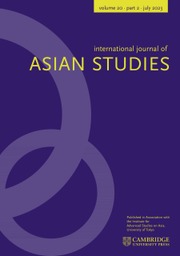Article contents
Nexus of self-organization: the expansion of collective responsibility networks among boatmen in nineteenth-century Chongqing
Published online by Cambridge University Press: 24 May 2021
Abstract
This article investigates the collective responsibility organizations among boatmen in nineteenth-century Chongqing, when the city became one of the most important metropolises on the southwest Qing frontier. It also introduces two successive turning points in self-organization that were associated with two different classes of boatmen – skippers and sailors. First, in 1803, skippers gained the authority to institutionalize their organizations through their negotiations with the local state regarding official services and service fees. Second, when similar service and fiscal tensions emerged between skippers and sailors in the mid-nineteenth century, the skippers facilitated and supervised the institutionalization of collective responsibility organizations that were run by the sailors themselves. By contextualizing this expansion of collective responsibility organizations within the multilayered interactions between skippers and sailors, this article proposes that the perspective of interclass networks is crucial for deepening the study of state−society interactions, the capital−labor relationship, as well as the tension between imperial integration and regional diversity in early modern China.
Keywords
- Type
- Research Article
- Information
- Copyright
- Copyright © The Author(s), 2021. Published by Cambridge University Press
References
References
- 1
- Cited by



